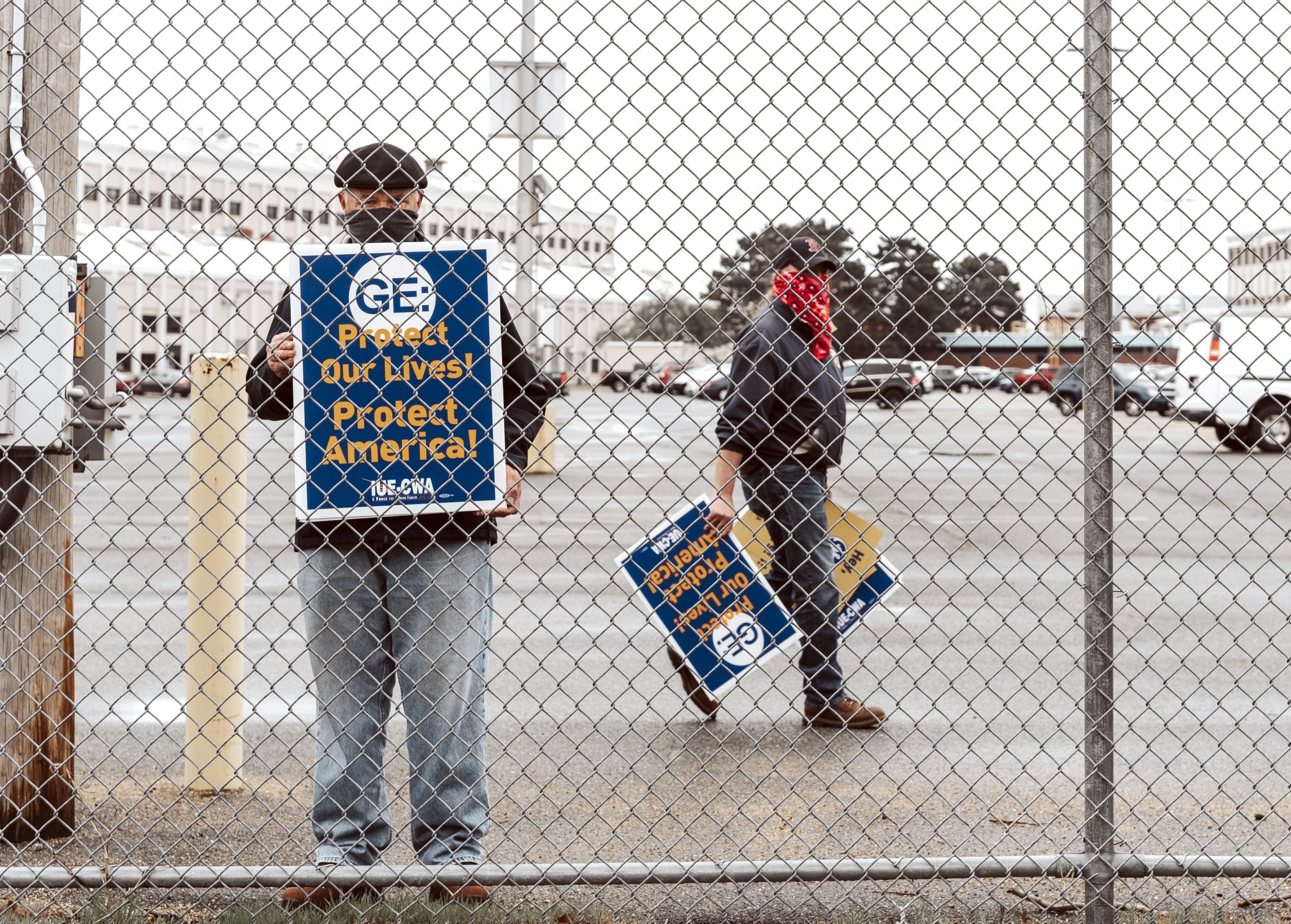LYNN — Lynn’s General Electric employees held a second round of silent protests on Wednesday, aimed at securing safer working conditions and additional paid sick leave, and urging the company to start producing ventilators at the plant.
Workers have been citing health and safety concerns at Lynn’s GE Aviation plant for more than a month, which came to a head with multiple employees testing positive for the coronavirus. As of Wednesday, there have been seven confirmed cases at the city’s plant.
“I feel it’s a dangerous situation,” said Adam Kaszynski, president of IUE-CWA Local 201, which represents 1,260 workers at the city’s River Works plant.
“The (personal protective equipment) is starting to come in, but there’s been inconsistencies and shortages throughout the pandemic. We still haven’t reached an agreement on what we feel is an adequate cleaning schedule and process.”
Fearing continued exposure and unsatisfied by what they consider to be a lack of action from management, Local 201 demanded a two-week shutdown of the factory last week. However, that request, which came after two days of similar protests last week, was denied by the company, Kaszynski said.
There also hasn’t been any movement from the company on their demands for an additional two weeks of paid sick leave and adequate daily sanitization of the plant between shifts, he said.
That has caused concern among employees who already have underlying health conditions, have immunocompromised family members or lack access to childcare, Kaszynski said.
Last week, 450 people chose to use their sick or vacation time so they would not have to report to work at the Lynn plant, Kasyznksi said, noting that some employees have already exhausted all of their paid time off, which has led some to take unpaid leave.
Still, the union claims some employees are coming into work sick because the company’s basic sick leave policy is set at or near the state minimum for many workers, which translates to five days of paid time off. In addition, Kaszynski said some employees who have presented doctors’ notes with orders to quarantine have been denied that time off from the company.
“We’re worried about people reporting sick,” said Kaszynski. “We’re worried that the people are out of time (or) running very low on time. The feeling I get is (GE is) willing to roll the dice on the safety of workers at the Lynn plant and we’re not.”
On Wednesday, Lynn’s GE employees joined workers around the country in silent, socially distant protests during their lunch breaks, which were held in the early morning hours, at lunchtime or at night, depending on their respective shifts.
In Lynn, the workers stood in a picket line six feet apart, inside the plant along Western Avenue. Similar demonstrations were held in Schenectady, N.Y.; Dallas, Texas; and Salem, Va., as part of the “GE Day of Action.” Last Monday, Lynn’s GE workers had joined Boston employees in protest.
“The continuing picket is about jobs and safety,” said Kaszynski. “We want our members to be safe where they work. Our position is we still don’t feel the conditions are safe for continued work at this point. The union’s position is the two-week paid shutdown is the best way forward as this peaks in Massachusetts in the coming days.
“With the recent announcements of layoffs and cuts in the GE supply chain, we feel that GE could recommission empty factories or workers facing layoff to build life-saving ventilators.”
The company has announced 10 percent of its aviation workforce will be laid off, but it’s not clear how the Lynn plant would be affected. Kaszynski has asked for information on the impact of that announcement, but has not heard back. However, as almost 90 percent of the plant’s production is military equipment, he does not anticipate any layoffs.
“My understanding is that our orders are strong and there’s no reason for layoffs in Lynn,” said Kaszynski. “So we do not anticipate layoffs but we are fighting for work to prevent them across the supply chain in the form of ventilators.”
Company representatives say they have been actively increasing health and safety measures at the plant, which has included doubling its annual cleaning budget, with more precautions that went into effect last week.
New measures have included daily temperature checks for all entering the facility, regular plant safety walks with site leadership, and upgrading time clocks to touchless scanners.
“GE’s No. 1 priority is the health and safety of our employees, and in line with the CDC, we have taken a number of preventive and protective measures to help protect our employees,” said Richard Gorham, a GE spokesman. “We have implemented additional, COVID-related paid leave policies and continue to work with individual employees who may have unique risk factors or situations.”
In addition, the company said it is doing everything it can to address the COVID-19 pandemic. Although there’s no plans for Lynn’s plant, GE Healthcare business is ramping up production of ventilators. Capacity has doubled, with plans to double capacity again by the end of the quarter.
GE Aviation is assisting in the effort to produce ventilators, the company said, noting that more than 40 employees have been deployed to GE Healthcare in Wisconsin.
However, the company’s aviation facilities continue to be used for aviation purposes, and therefore, there are no plans for them to be repurposed into medical equipment production lines, the company said.
“Our Lynn facility is considered essential by Homeland Security because our work provides mission-critical equipment to the U.S. military, and this facility remains focused on aviation production of engines and spare parts for fighter jets and helicopters,” said Gorham.
“Separately, GE’s healthcare business has already doubled ventilator production and continues to explore additional opportunities to support the fight against COVID-19, prioritizing fast, efficient options to meet this immediate need.”

